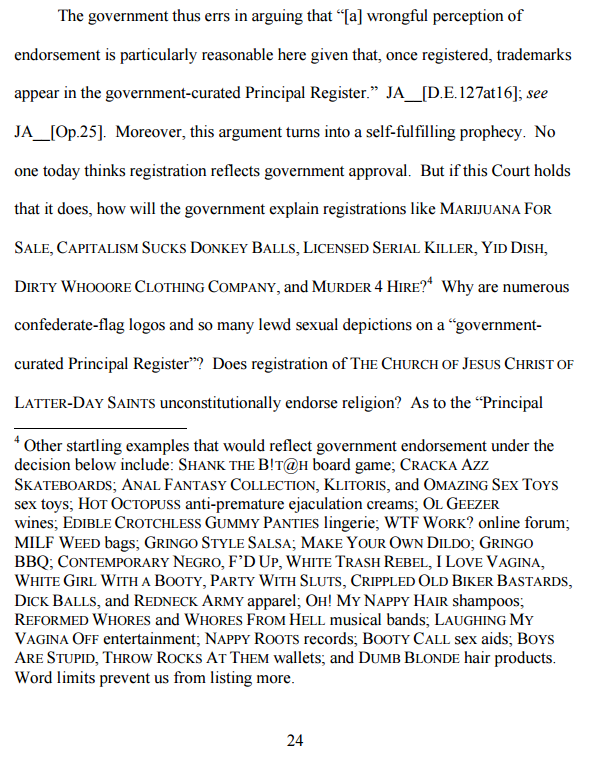In finding that the Washington Redskin’s trademark was government speech, the district court found that Walker v. Texas Division, Sons of Confederate Veterans provides the rule of decision. On appeal to the Fourth Circuit, the Redskins (represented by Lisa Blatt at Arnold Porter) explain why a trademark is unlike a license plate:
The District Court erred (JA__[Op.19-22]) in relying on Walker v. Texas Division, Sons of Confederate Veterans, Inc., 135 S. Ct. 2239 (2015), which held that Texas’s specialty license plates convey government speech. Walker reasoned that “insofar as license plates have conveyed more than state names and vehicle identification numbers, they long have communicated messages from the States.”
Id. at 2248. For a century, States “have used license plate slogans to urge action, to promote tourism, and to tout local industries,” and “plate designs are often closely identified in the public mind with the State.” Id. (bracketing and quotation marks omitted).
By contrast, as discussed above, the two million registered trademarks have never “communicated messages” from the government. See supra pp.4, 23-24 & n.4. No one thinks about the government when buying NIKE shoes, surfing GOOGLE, or watching NATIONAL FOOTBALL LEAGUE games. Many marks, such as ACLU and NATIONAL RIFLE ASSOCIATION, represent organizations that regularly oppose government regulation.
The District Court reasoned that in publishing the Official Gazette and the “Principal Register,” the “government is the literal speaker.” JA__[Op.25]. But the government publishes copyright registrations, and thus the court’s theory would permit the government to discriminate against books based on content and viewpoint. The government could refuse to provide permits for unpopular rallies if it simply posted all permits on the Internet.
Walker observed that “Texas maintains direct control over the messages” on specialty plates, including all design, color, typeface and alphanumeric patterns, 135 S. Ct. at 2249, and that Texas reserved the right to deny a plate for any reason, id. at 2245. By contrast, the Lanham Act generally permits registration of any distinctive mark that would not cause consumer confusion. And the PTO hardly retains direct control over cancellation; it relies exclusively on private citizens to seek cancellation. Infra pp.40-41.
Seems persuasive to me.
H/T How Appealing
Update: Via Zoe Tillman, this page of the brief is remarkable:
